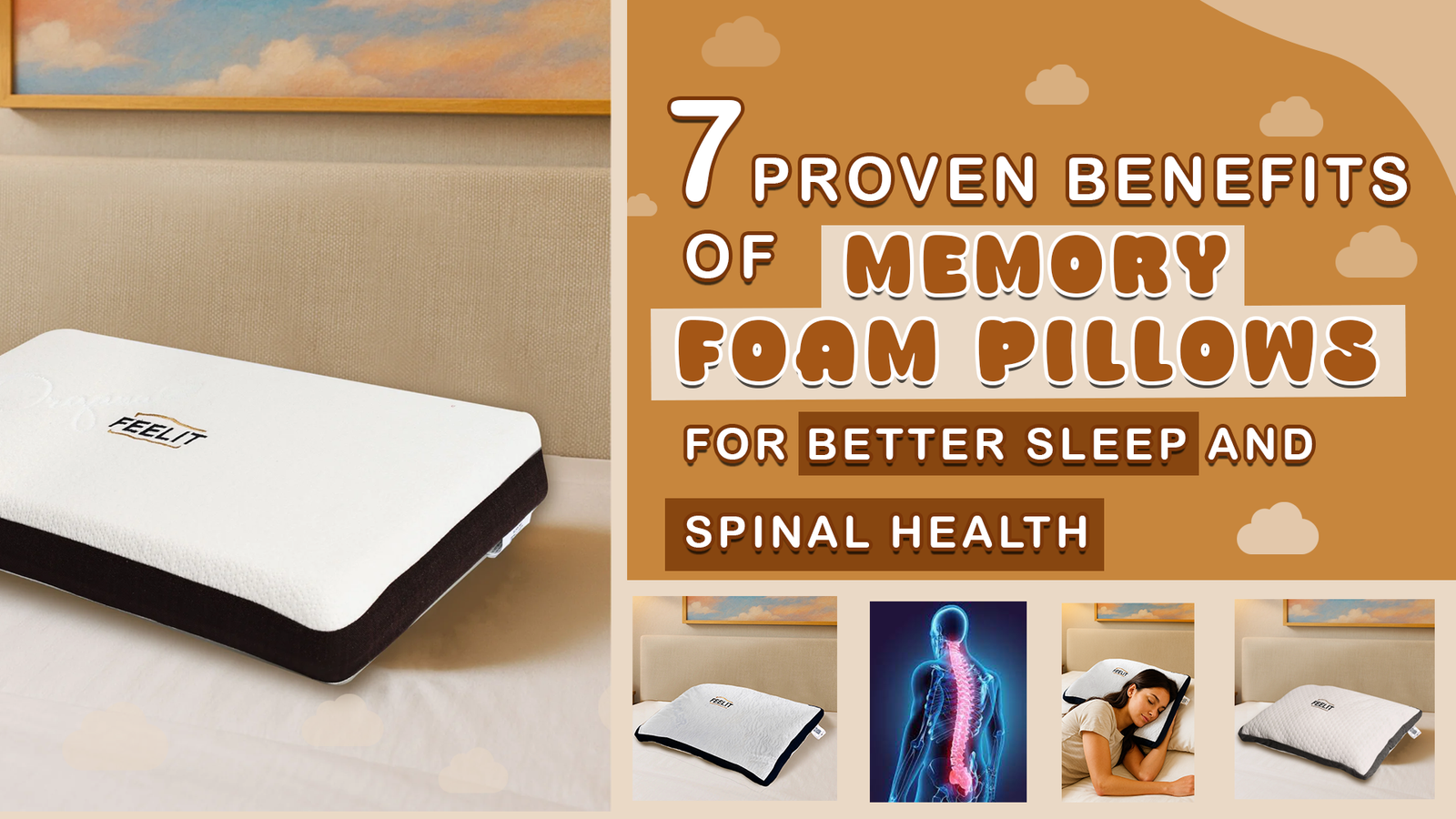We’ve all been there: waking up with a stiff neck, sore shoulders, or that general feeling that your sleep just wasn’t as restful as it should’ve been. If this sounds familiar, it might not be you—it could be your pillow. Yes, that pillow you’ve been hugging every night might be causing more harm than good.
That’s where memory foam pillows come in. These pillows have become a game-changer for many sleepers, and it’s not just about the hype. Memory foam actually offers a ton of benefits, especially when it comes to your spine and overall sleep quality. If you’ve ever wondered what the fuss is about, keep reading. Let’s dive into 7 benefits of memory foam pillows that could totally transform your sleep.
1. Helps Keep Your Spine in Check
Your spine’s health should be a top priority, and your pillow plays a big part in that. Memory foam pillows are known for their ability to support the natural curve of your neck and spine. The foam is designed to mold to your head and neck, helping to keep your spine properly aligned while you sleep.
If you're someone who wakes up with neck pain or feels stiff after lying down, this is where memory foam shines. The pillow adapts to you, not the other way around, meaning your spine stays in a neutral position all night long. It’s like giving your spine a mini massage while you sleep.
Why It Matters: Proper spinal alignment can prevent neck and back pain, so you wake up feeling refreshed, not sore.
2. No More Waking Up with a Sore Neck
We’ve all been there—waking up with a crick in your neck or feeling like you’ve been in a wrestling match with your pillow all night. One of the best things about memory foam is how it relieves pressure. Unlike regular pillows that might push your neck into awkward angles, memory foam molds to fit your head and neck. This means no more painful pressure points.
When your pillow conforms to your shape, it helps to evenly distribute weight across your head, neck, and shoulders, keeping everything nice and balanced. Whether you’re a side sleeper, back sleeper, or combo sleeper, the memory foam will adjust to you, so your neck stays comfy all night.
Why It Matters: Less tossing and turning, fewer morning aches, and deeper, more restorative sleep.
3. Great for Allergy Sufferers
If you’re one of the many people dealing with allergies, traditional pillows might not be doing you any favors. Dust mites, mold, and bacteria love to hang out in regular pillows. Yuck! But here’s the thing—memory foam pillows tend to be hypoallergenic, which means they resist allergens that can trigger your symptoms.
For anyone who’s been waking up sneezing or with itchy eyes, a memory foam pillow could be a game-changer. The foam doesn’t trap dust and debris like traditional fillers, and many memory foam pillows come with washable covers to keep everything fresh.
Why It Matters: If you’ve been struggling with allergies, a memory foam pillow might just make a big difference in your quality of sleep.
4. Keeps You Cool When Things Heat Up
Here’s a common scenario: you’re finally getting comfortable, but suddenly, you start feeling way too warm. Memory foam pillows have a bit of a reputation for trapping heat, but don’t worry, this has changed over the years. Many newer models come with cooling technologies that help regulate temperature.
Some memory foam pillows have cooling gel layers or breathable fabric covers that promote air circulation, keeping you cool even when the night gets warm. If you're a hot sleeper or live in a climate that’s humid, this could be a huge win for you.
Why It Matters: No more waking up in a sweaty mess. You’ll stay cool, comfortable, and, most importantly, sleep uninterrupted.
5. Built to Last—No Sagging Here!
Here’s the thing: memory foam is durable. Unlike traditional pillows that start to flatten and lose their shape after a few months, memory foam keeps its form over time. Even if you’ve had your pillow for a while, you’ll notice it’s still giving you the same level of support it did when you first bought it.
This means you won’t have to replace your pillow every year, which makes memory foam a smart investment. Sure, it might cost a little more upfront, but you’re paying for durability and comfort that lasts.
Why It Matters: No more constantly replacing pillows. You get consistent support night after night.
6. Could Help with Snoring and Sleep Apnea
If you or your partner struggles with snoring or even mild sleep apnea, a memory foam pillow might be just what you need. These pillows are designed to offer optimal support, which can help keep your airway open while you sleep. Some memory foam pillows are even shaped to elevate your head slightly, making it easier to breathe throughout the night.
By improving airflow and reducing pressure on the neck, you may find yourself snoring less, or at least sleeping more soundly.
Why It Matters: If you’ve been dealing with snoring or disrupted sleep, a memory foam pillow could help you breathe easier and sleep more peacefully.
7. Customizable to Fit Your Sleep Style
Not all sleep styles are the same, and that’s one of the great things about memory foam pillows—many of them are adjustable. Whether you like a soft pillow that lets you sink in or a firmer one for more support, you can find a memory foam pillow that works for you. Some brands even offer pillows where you can adjust the loft or the firmness by adding or removing layers of foam.
This level of customization means you’re not stuck with a one-size-fits-all pillow. You can tailor it to meet your exact needs, whether you’re a side sleeper, back sleeper, or stomach sleeper.
Why It Matters: A pillow that adapts to your unique sleeping needs = a much better night’s sleep.
Final Thoughts: Is a Memory Foam Pillow Worth It?
With all these benefits, it’s easy to see why memory foam pillows have become so popular. Whether you’re looking to improve spinal health, reduce neck pain, manage allergies, or just sleep more comfortably, a memory foam pillow could be the missing piece to your sleep puzzle.
If you haven’t made the switch yet, it might be time to consider it. After all, you spend around a third of your life sleeping—shouldn’t you be doing it as comfortably and healthily as possible?




